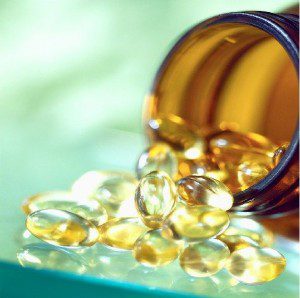Contributing Writer for Wake Up World
Do you think Omega3 supplements are good for everybody? A few years ago I believed they were, because everybody would tell you that: doctors, naturopaths, nutritionists, scientific studies, Omega 3 producing companies…All kind of articles and studies were praising the amazing health benefits of Omega3”²s and I too believed we all have too much Omega6 in our bodies and so we have to “flush it out” with a lot of Omega3.
Until I started supplementing first with fish oil, krill oil, then hemp oil and then fish oil again, just to experience bad side effects, mostly every time! I managed to generate a hormonal imbalance, greasy skin and acne, among other complaints. I made sure the quality of the supplements was as good and pure as I could get… So what was the problem then? Here is what I learned in the meanwhile…
[pro_ad_display_adzone id=”110028″]
One Man’s Healing Omega3 Is Another One’s Poison
Unless you view health in terms of BIOCHEMICAL INDIVIDUALITY, nothing makes any sense really. You would constantly observe how a certain diet / supplement / nutrient works very well on a category of people, just to have no effect on another and making a third one worse!
With Metabolic Typing we can find out which are the right diet and supplements for each unique metabolism and what treatments are going to work and solve negative symptoms on a life long basis.
When Are Omega3”²s Beneficial?
When the cells are too stiff and lacking in permeability, this is called predominant ANABOLISM. If a person has an anabolic imbalance, instead of producing energy with oxygen, the body is relying on lactic acid fermentation, which is very inefficient. In this case there is insufficient fatty acid activity and excess sterol activity, so supplementing with Omega3 fatty acids might be beneficial.
When Are Omega3”²s NOT Beneficial?
When the cells are too “leaky”, this is called predominant CATABOLISM. In a catabolic imbalance there is excess catabolic activity that is taking place due to lipid peroxidation. Because oxidation is out of control, the body produces free radicals rather than efficient energy. A person with a catabolic imbalance has excess fatty acid activity and a decrease in sterol activity. In this case supplementation with Omega3 fatty acids is not needed, but saturated fats and sterol fats to help increase anabolic processes, as well as vitamin E and antioxidants. More Omega3”²s will just cause further degradation of cells.
So it all depends on the biochemical constituents of each person.
Uses and Benefits of Omega3 supplementation
In conditions like neoplasia and hyperplasia that underlie the development of cancer, the proliferation of cells can be very serious. In these cases, Omega3 supplementation will work very well because it generates the breaking down of cells, both in quantity and in anaerobic tendencies.
Renowned Dr Johanna Budwig was successfully using organic flaxseed oil combined with organic cottage cheese in preventing and curing cancer. Emanuel Revici, one of the most brilliant physicians in history, with an impressive and revolutionary research record, was among the first physicians to use Omega3 fatty acids to treat cancer.
Why do people with inflammatory conditions feel relief after taking Omega3”²s? Because these fatty acids work by inhibiting Prostaglandin 2 (a hormone like substance that promotes the inflammatory response), a process very similar to how aspirin works. Still, the anti-inflammatory response is temporary, but the long term effects might be damaging to the cells, if not monitored regularly by your health care provider.
Dr. Weston Price also gave cod liver (only a 1/2 tsp a day) oil along with high-vitamin butter oil, extracted by centrifuge from good quality spring or fall butter. He found that cod liver oil on its own was relatively ineffective but combined with high vitamin butter oil (a source of saturated fat) produced excellent results.
Price recommended a small amount of cod liver oil to get essential vitamins A and D. But many health experts believe that in the modern world we have access to food and supplement sources that provide the same without potential side effects and the risk that comes with processing unstable oils.
Risks And Negative Effects Of Supplementing With Omega3
Polyunsaturated oils (PUFA) like Omega3 fatty acids go rancid. These oils are very susceptible to damage induced by heat and oxygen. PUFA’s have shown to rapidly induce vitamin E loss in the body through their induction of lipid peroxidation and the free radical activity that they induce.
What other experts, who did extensive research on oils and fats have to say:
”ŽIn declaring EPA and DHA to be safe, the FDA neglected to evaluate theirantithyroid, immunosuppressive, lipid peroxidative (Song et al., 2000), light sensitizing, and antimitochondrial effects, their depression of glucose oxidation (Delarue et al., 2003), and their contribution to metastatic cancer (Klieveri, et al., 2000), lipofuscinosis and liver damage, among other problems. (Ray Peat)
In his book, Saturated Fats May Save Your Life, Bruce Fife concludes that we can get what we need in terms of fatty acids with balanced diet and supplementation is not recommended, due to oxidation issues and possible imbalances in the metabolic processes.
He further states that all oils are typically rancid by the time they hit the store shelves and highly oxidative, even flax oil. Extra virgin olive oil and coconut oil are the only recommended products and have the best heat rating and don’t oxidize like the other polyunsaturated oils. Also, Omega3”²s are more subject to oxidation than Omega6”²s.
What’s The Real Imbalance When It comes To Omega3”²s and Omega6”²s?
After observing the clinical reality and correlating it to the use of Omega3”²s, many health experts now claim that the Omega3 to Omega6 balance is actually a fantasy. The threat of oxidation is very real from both fats, and the concentration on the “balance” between them is a diversion from the real degeneration that a diet rich in PUFAs creates.
Most commercially available meat these days (even organic) comes from animals that are fed on industrial feed (corn, soy, grain) which are high in polyunsaturated fats and their tissues reflect this diet – high in polyunsaturated fats which become toxic. Add to that the abundance of polyunsaturated oils in modern diets like corn oil, soybean oil, canola oil, etc and you already create an imbalance that leads to inflammation and degeneration.
The real balance that should be considered is rather that of saturated to polyunsaturated fat in the diet not that of Omega3 to Omega6.
Conclusion
The jury is still out on the efficacy supplemental use of “essential” fatty acids, but the studies (which were mostly funded or conducted by the fish oil manufacturers) show they are generally a good idea. However, the oils used in the studies are almost invariably not the kind we can buy from the store shelves or online. What we get has been processed, stored, shipped and oxidized to one degree or another.
The most important thing to remember is that the benefits/risks of polyunsaturated Omega 3”²s are entirely dependent upon our own individual biochemistry, biochemical imbalances and health disorders at any point in time.
Article Resources
Fife, Bruce. ND. Saturated Fats May Save Your Life
Schenker, Guy, DC. The Nutri-Spec Letter, Vol 16 No 12
The Healthexcel System of Metabolic Typing
http://www.westonaprice.org/cod-liver-oil
http://raypeat.com/articles/articles/fishoil.shtml
http://www.revicimedical.com/Scientific_overview.htm
Recommended articles by Raluca Schachter:
- Vitamin D Supplementation: This is Why It Can Be Wrong
- Hypothyroidism or Hashimoto’s? What You Need to Know and Why It Matters
- Understanding Cannabis Oil
- 6 Steps to Solve Your Blood Sugar Problems Permanently
- Antibiotic Resistant Infections: The Dangers… and How You Can Avoid Them
- What Really Happens When You Take Antibiotics?
- Understanding Inflammation and How to Eliminate It Naturally
- Listen to Your Body. Correct Food Ratios. Reverse Disease.
- Cholesterol Myths Debunked
- Follow The Money In “Sick-Care”: What’s Behind The Drugs And Needles?
- What Happens In Your Body When You Suffer From Thyroid Disease?
About the author:
 Raluca Schachter is a dedicated Clinical Nutritionist / Natural Health Practitioner a.k.a “The Health Detective”. Raluca was able to naturally reverse chronic health conditions she was struggling with most of her life, and now uses her knowledge to help as many people as possible do the same. Her health programs and diet plans offer a very unique and comprehensive approach to health, where individual nutritional and biochemical requirements are firstly met using specific nutrients and foods that each metabolism thrives on. Raluca offers her services to international clientele and her practice is fully online based. You can connect with Raluca at www.metabolicenergy.net and https://www.facebook.com/raluca.schachter.metabolicenergy
Raluca Schachter is a dedicated Clinical Nutritionist / Natural Health Practitioner a.k.a “The Health Detective”. Raluca was able to naturally reverse chronic health conditions she was struggling with most of her life, and now uses her knowledge to help as many people as possible do the same. Her health programs and diet plans offer a very unique and comprehensive approach to health, where individual nutritional and biochemical requirements are firstly met using specific nutrients and foods that each metabolism thrives on. Raluca offers her services to international clientele and her practice is fully online based. You can connect with Raluca at www.metabolicenergy.net and https://www.facebook.com/raluca.schachter.metabolicenergy
[pro_ad_display_adzone id=”110027″]







